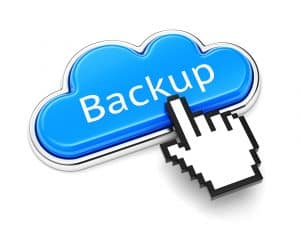
Your WordPress information base contains each post, each comment and link you have on your blog. In the case that your information base gets deleted or attacked, you can lose all your data. There are numerous reasons why this could occur, and not all are things you can handle.
With an appropriate backup your WordPress data and documents can be easily returned and protected. With the backup you will save all your data, plugins, theme, or additions you have ever made on the site.

We've all heard it before, but we don't usually think about how important website backups are. However, should something happen to your website, it's best to have a copy of your website in a safe place.
The point of a website is to provide information for others. If you don't keep backups of your website, the information you provide could be lost forever. Having a backup is the first step to making sure that doesn't happen.
The risk of losing data or having your website hacked is increasing every day, as the WordPress CMS has become so popular that it is getting more and more attention from cybercriminals. It's always important to have a backup to fall back on so that no damage is done and you can continue doing what you were doing before the attack as if nothing happened.
This depends on how frequently you blog/change your website’s content, how regularly you need/want to do this, and how you would feel if your information base were lost alongside a couple of posts. It is your choice and it can vary from daily backups to once a week or month.
Of course, you will decide what will you backup on your WordPress website, however, it is important to have in mind that all the data is important, so the best thing is to back up everything that you have on your site. This includes also every comment, link, or post.
It's never a good idea to do a partial backup because you risk losing potentially important and valuable data. Not to mention, if you don't have a full copy of your website, it's impossible to restore it.
Even if you manage to perform a partial recovery, it won't be the same as before and potential vulnerabilities may still be present or even new ones may appear. Don't take any chances and always make a full backup of your website. This way you can be sure that everything is safe and you won't have to worry about accidental loss.
WordPress website backup strategy is a must for every WordPress website owner. You should consider a backup strategy for your WordPress website to ensure that you can quickly restore your website if something goes wrong. Therefore, backing up your website should be an integral part of your WordPress website.
There are many strategies, schemes, and principles that underlie regular backups. Perhaps the most popular strategy of all is to have 3 copies of your website in 3 different locations.
You should store one copy of the website locally on your computer's hard drive, your network drive, or an external hard drive. Make sure your computer (or at least the drive you store it on) is clean so your backups don't catch infections.
The second backup should be kept on your hosting, assuming your hosting offers a regular daily backup (some do for 30 days).
The third backup should be scheduled to be uploaded to a cloud server of your choice for safekeeping. That way, if your own hardware and hosting fail (highly unlikely, but you never know), you'll have a copy safely on a secure server.
Also, don't forget to test the validity of your backups from time to time, and this can easily be done using the Staging Site feature.
This solution is for the people who already have a certain experience on website backends. If you are not sure what to do then you should ask for help. In short, you should login on your hosting site.
In this case the site administrative system that your web host has. Then you should search for available backup tools and download the latest one. If you cannot find it then there is programme like MySQL and PHPMyAdmin.
In this case you just login to the cPanel and in the ‘Files’ search for the backup and restore folder. After this you choose full backup on the Panel and put the date from when you want to have your backups.
In the end just select the archive type and download it. From this is visible that is not so hard to create a good backup of your data from the conformity of your home.
Another (increasingly) popular solution for creating backups.
After you purchase a cloud storage service, you can use it to securely store all kinds of files on it, including your website backups. You can manually upload backups to the cloud by first downloading the website backup and then uploading it to your cloud server, or you can connect your backup tool to your cloud server and set it to automatically upload backups to the cloud.
Some backup tools offer a cloud service with their tools, so it's very easy to set everything up and you don't have to waste time searching for a cloud server provider.
Off-site backups are probably the safest option for recovery if your site is hacked or suffers an unexpected crash, as they are offline and therefore do not get infected.
These are usually created on portable hard drives, USB memory sticks, and the like. But as always, you should store them on a secure device and always make sure that the device is clean and not infected with malware.
Most plugins offer the ability to enable automatic backups. All you have to do is go into the plugin settings and set it to perform automatic backups. You can decide if you want them to be daily, weekly or monthly. You can also choose the time of day that the plugin performs automatic backups (preferably at night, while you're sleeping, so it doesn't interrupt your work).
To make sure the plugin has done its job, you can also set it to notify you via email if the backup has failed for some reason, so you can check what happened. Additionally, you can choose the number of backups it keeps, which is usually limited by storage space.
In order to backup your data and information automatically using plugins you just need to install plugin that you like, configure needed settings and that is it. Some of the best plugin used for backups are: All in one WP migration, Updraftplus and Duplicator plugins, but also many others.
Your first choice is to simply choose a hosting provider that performs regular full backups of your WordPress account. WP Engine Managed WordPress hosting, for example, performs regular backups of all your main WordPress files, themes, and plugins, as well as your database (including all of your media).
Additionally, you can start your own backups at any time (for example, before a big WordPress update or when you decide to change themes).
This is not as hard as you might think. First, go into the options of your backup plugin on the site you want to back up and create a file backup. After it's created, download it to your computer. Once it is downloaded, connect to your cloud service provider and upload the file from your computer to a cloud server directory of your choice. After the upload is complete, you're done and that's all there is to it.
Your website could be the target of various malware, viruses, and other infections circulating on the Internet. Hackers use them to infiltrate websites and steal data from those websites. They also cripple these websites and make them unusable.
Of course, you can try to clean up the site, but what if that doesn't help? That's why there are backups that you can use to restore your valuable site(s) and regain control over them.
Let's say you've spent hours working on your website and something goes wrong. Maybe the site crashes for some unknown reason (or because of some error you did) or it gets attacked by a hacker. If you don't have a backup, then all your hard work is for nothing and you have to start all over again and waste even more time repairing the damage.
This way you lose valuable time and lose money. Always make backups after you have done some work on your website so that you can restore it immediately in case of an emergency.
Time is money for any business or person. If you have to build everything from scratch, it can be a big blow to your finances. Not only do you waste valuable time getting everything back in order, but you lose potential customers and your sales can drop.
Depending on the size of the website, it can take days, weeks, or even months to get everything back in order, and that's something no one can afford if they want to stay in business.
All of this can be avoided if you do just one simple thing and that's back up your WordPress website regularly. So be smart and always make regular backups because it can save be a life saver.
If you are not backing up your data automatically or manually you leave a lot of space for hackers to steal your data, sensitive information, and files.
The same case is also with malwares. If your data is not protected, you are easy target for both of these things and you can easily lose everything that you made on your site.
According to everything said, you see that for the backup you do not have to spend so much of your time and advantages of backup solutions are very important for everything that we have.
With this in mind, one should always have time to backup all the data and information because on in other case the damage could be huge.

The backup schedule determines how often the data is backed up and where the backup is stored. You can set it to a daily, weekly, or monthly time. You can choose the time it runs, and even the number of backups kept, so you don't clog up your storage with a large number of old or unnecessary backups.
Make sure you have this option enabled, as people often forget to make backups and this way it is done for them and they don't have to worry about it.
It is important to back up the website on a regular basis. Thankfully, WordPress and various hosts make this a lot simpler. Make several copies of your most recent backup files so that you can recover in the event of a crisis.
What are you waiting for, do it now!